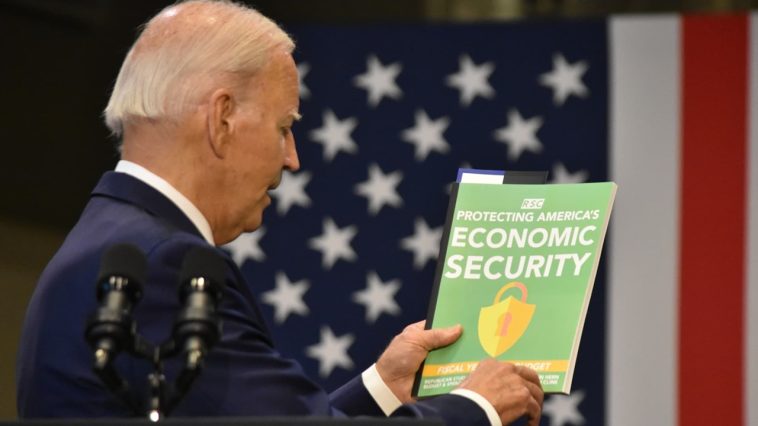As the current president, Joe Biden, and his team continuously seek to assure Americans about the positive effects of their overall economic strategies – frequently referred to as ‘Bidenomics’ – it appears that an increasing majority of citizens are finding their lives under these policies to be less satisfactory than the times under previous President Donald Trump. The looming presence of a significant new statistic particularly stands to compromise Biden’s prospects for a second term.
A recent, unconventional survey conducted by Zogby Analytics yielded some telling insights into the deepening crisis of food ‘insecurity’ being faced by minorities, young voters, and those whose education ended with high school. Data from the survey indicated that a staggering 14 percent of those questioned had gone at least a day without food during April.
A particular demographic seriously impacted by these effects of Bidenomics, resulting in drastic and unceasingly high food prices, are African Americans. This group, traditionally a staunch Democratic voting base with a growing shift towards Trump, has been especially hard-hit under Biden’s watch.
The survey broke down its findings, demonstrating that 34% of African American voters aged 18-24 were nearly five times more likely to experience food insecurity in the preceding month compared to voters within the 55-69 age group, which only had a 7% figure. The situation was further exacerbated among African Americans in rural communities, where the rate of food insecurity was 31%, compared to 21% amongst city dwellers, and 16% amongst those living in the suburbs.
Another angle highlighted was the effect of education on food security. African Americans without a higher education degree faced a food insecurity rate of 23%, which is twice the rate of those who had attained a college education, where the rate stood at 10%, as per the report’s analysis.
Hispanics represent another demographic bearing the brunt of Biden’s policies. According to the survey’s findings, this demographic displayed similar patterns of distress, particularly notable within specific subsets. As many as one in five, or 19%, of the Hispanics surveyed experienced food insecurity.
When delineated by age, 30% of younger Hispanics, aged 18-24, were three times more likely to face food insecurity compared to those within the 55-69 age group, where only 11% reported similar issues. Also akin to the patterns observed among African Americans, Hispanics in rural areas presented a higher rate of food insecurity, with 29% experiencing food shortages, compared to their urban (20%) and suburban (14%) counterparts.
Education level also appeared to be significant factor among Hispanics, with those without a college degree twice as likely to be food insecure, showing a rate of 22%. Meanwhile, the figure for Hispanics with a college education was half of this, with only 10% reporting going without food for more than twenty-four hours in the month prior to the survey.
As Jonathan Zogby, the CEO of the polling firm, shared with the Examiner, the increasing food prices driven by inflation have left people nationwide struggling to afford groceries. Zogby acknowledged the challenge faced by President Biden to avoid further increases in inflation or food insecurity figures within the next six months.
Adding to the President’s concerns, Zogby suggested that the issue could risk Biden’s standing in key swing states, particularly where African American and Hispanic voters are finding it more difficult to put food on their tables. Despite these realities, Biden has dismissed concerns regarding rising food prices, confidently asserting to CNN’s Erin Burnett that Americans have the spendable income they need.
As per further notes from the Examiner, the polling firm had initially conducted the survey in January, a time when there was a prevailing hope that inflation would begin to decrease. Contrary to this expectation, inflation has remained high, while the country is now experiencing an upswing in unemployment claims, further underscoring the reality that Bidenomics appears to be faltering.
Zogby’s analytical summary intensified this grim outlook, suggesting that if unchecked inflation persists, and marginalized voters continue to experience food shortages, the President might face a formidable challenge in the coming elections.
Consideration was also placed on the possibility of key voting demographics such as African Americans and Hispanics voting against President Biden in upcoming elections due to ongoing struggles with food security. These hard-hit communities could potentially swing election results, contributing to either Donald Trump or Robert F. Kennedy Jr.’s favor.
It was pointed out in Zogby’s assessment that the President’s best course of action would be to focus more on his achievements during his first term, thereby avoiding being labeled a ‘one-term president’. Underlining this point was the anticipation regarding whether a majority of African American and Hispanic voters could continue to support Biden while facing their ongoing hardships.
Regardless of the steady economic growth that has been observed for several months, and a downward trend in inflation from historic highs during Biden’s first few years in office, these developments are not a cause for celebration for a majority of the working population in America, as per a report from March.
This report highlighted the persistent issue that the cost of living continues to rise for many Americans despite positive economic indicators. CNN’s note on this echoed the report’s sentiment, stating that life remains excessively costly for a significant number of individuals.


